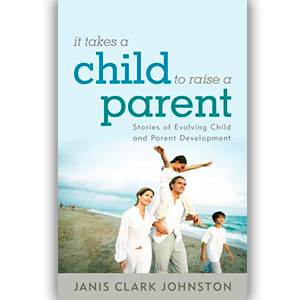
It Takes a Child to Raise a Parent – Meeting Everyone’s Needs
Life never goes as planned, and Janis Clark Johnston, author of It Takes a Child to Raise a Parent, claims, since our brains are like storage bins, everything that’s ever happened to us is waiting there for a chance to come out. She believes, “We struggle in looking at a child’s needs one interaction at a time because we have not examined enough of our own needs one interaction at a time.” Therefore, in her book, Johnston illustrates how children end up raising parents by helping them connect to an earlier time in their lives when they felt distress.
With lives as busy as they are nowadays, Johnston argues it’s important to address energy needs. She argues, “We must model for our children a sense of how to positively engineer our own energy cycles, because we pass on to our children both verbal and nonverbal energy inheritance.” The reality is we all have our moods, but if we fail to deal with them, then they might confuse our children, leaving them to incorrectly assume it’s the result of something on their part.
Whether it’s getting enough sleep, getting something to eat, or getting some exercise, parents often neglect their energy needs for the “good” of the family. Johnston believes parents need to reevaluate the choices they are making in order to determine how best to replenish personal energy needs. According to Johnston, fast food is a big issue, “American’s spend more of their income on fast food than on higher education, personal computers, computer software, or new cars. In fact, more money goes into the coffers of fast-food restaurants than into the combined purchases of movie tickets, books, magazines, newspapers, videos, and recorded music.”
Johnston suggests parents start reenergizing by mapping their energy – describing the energy levels of their caretakers, assessing their energy levels as a child, and determining the environmental factors interfering with their energy today. Once parents have a handle of what their issues are, they can begin to restructure their lives so they have more energy. Since juggling every family member’s needs takes planning, Johnston suggests not only scheduling time to get chores done but also bond with each of your children individually.
I’ve been booking downtime, kid-time, and me-time ever since I blogged about The Balanced Mom by Bria Simpson. It’s the only reason I’m able to juggle working full-time, graduate school, and writing for Richmond Family with two kids. But Johnston’s chapter on creativity needs struck a chord with me, since I started a ceramics class this month. I know what you’re thinking, Why would I add that to my plate? It was a birthday present. My husband surprised me after he overheard me telling my daughter I was jealous that she learned how to create pottery on a wheel, as that was something I’d always wanted to do. I went because I didn’t want to hurt his feelings and ended up feeling more energized than I had in a long time.
“We don’t stop playing because we grow old; we grow old because we stop playing,” said the playwright George Bernard Shaw. Johnston includes this quote in her convincing chapter on the need more creativity. After having blogged about Out of Our Minds by Ken Robinson, I’d already been sold on the idea that kids need more creativity in their lives, but Johnston showed me parents do, too. And while one could make the case that all the writing I do is a form of creativity, it’s not the same as covering my hands with clay just for fun. Ultimately, Johnston helped me see that I need to be more creative with my parenting problem solving so that as my children age they won’t tune me out because they’ve already heard what I have to say.
What makes It Takes a Child to Raise a Parent so powerful is how effectively she establishes that “we can feel five, or ten, or fifteen all over again when our child reaches five, ten, or fifteen years of age and their experience draws forth one of our stories and its meaning.” Whether its energy, creativity, discipline, bonding, or ability needs not being met, Johnston give parents the information they need to understand what they’re going through and the tips they need to evolve right along with their children.
Follow @WinterhalterV on Twitter for updates on blog posts or like Parenting by the Book on Facebook.
Read my other blog Befriending Forty.






